Enab Baladi’s Investigation Team | Haba Shehadeh | Murad Abdul Jalil
“After more than eight years, the victims of al-Assad’s brutality and their families have become one step closer to justice and accountability.” With these words, as he cries, the dissident Syrian officer known as Caesar welcomed the news of the bill that has been named after his name to be officially adopted by the United States.
Caesar leaked 55,000 pictures of detainees killed under torture in Syrian prisons, and testified four times before the US Congress, demanding an end to the killings in Syria and holding criminals accountable.
Caesar is the “largest” penal law against the Syrian regime and its allies. It has been approved five years after passing several times in the American Congress, to ensure “holding al-Assad’s regime accountable … and justice for its victims,” wrote US Secretary of State Mike Pompeo, via his Twitter account.
According to its latest updates in June, the US Congress classified the law as one of the coercive economic means “to compel the government of Bashar al-Assad to halt its murderous attacks on the Syrian people and to support a transition to a government in Syria that respects the rule of law, human rights, and peaceful co-existence with its neighbors.”
However, US President Donald Trump’s signing of the law on Friday evening, December 20, does not in itself mean reaching a direct accountability against war criminals in Syria, as legal and human rights activists, whom Enab Baladi interviewed, considered it an attempt to put political and economic pressures on the Syrian regime, amid fears that the Syrian citizen will bear its consequences.
Sanctions do not bring justice to anyone
Political-economic pressure, but no human rights mechanisms
The terms “interrogation and accountability” recur in the text of the Caesar Act. This indicates at first glance the US’s tendency to pursue and prosecute war criminals in Syria, mainly the President of the Syrian regime, Bashar al-Assad, as the State Department stated in December 20.
However, the law does not directly lead to this concept. It is rather a means of political and economic pressure on the Syrian regime and its allies, and not a judicial instrument in the sense of arresting and prosecuting people.
Enab Baladi interviewed a group of human rights activists and jurists to discuss the link between the law and the prosecution of war criminals, and the mechanisms in which the Caesar Act can be used.
The Director of Syrian Legal Development Program (SLDP), Ibrahim Olabi, asserted that the concept of accountability and interrogation must first be widened. Accountability does not only mean judicial procedures, but any action that can be taken which constrains or worries the Syrian regime, whether they are economic sanctions or the prevention of giving it legitimacy.
He pointed out that the Caesar Act does not have a judicial accountability tool in the sense of arresting and prosecuting perpetrators of war crimes, as it rather inscribes names on the sanctions lists, prohibits financial communication with them and imposes financial as well as economic sanctions on any party that violates these sanctions.
The Head of Syrians for Truth and Justice (SJT) Bassam al-Ahmad, believes that there is a kind of “evasiveness” by the Americans in the law. Despite the presence of the terms of interrogation and accountability, the law does not talk about a mechanism of accountability and taking measures against crime perpetrators; it rather talks about sanctions against the regime.
Al-Ahmad told Enab Baladi that the US is talking about strengthening the issue of accountability, as the State Department stated in its statement that “The Caesar Act provides the United States with tools to help end the horrific and ongoing conflict in Syria by promoting accountability for al-Assad’s regime.” Some may think at first glance that there will be mechanisms for accountability, crimes documentation, legal prosecution and actions against the perpetrators of these crimes, but the text of the Act talks about a set of procedures and penalties against certain figures in Syria, such as the president and any party providing support to the regime.
Al-Ahmad stressed that there are no mechanisms in which the law can be used to refer war criminals in Syria to international courts or to the Criminal Court. This is because this Act is not “purely an accountability mechanism,” such as the International, Impartial and Independent Mechanism (IIIM) that collects, preserves and analyzes evidence of violations. It is rather is a political pressure tool aiming to compel the Syrian regime to make political concessions, especially with regard to the work of the Constitutional Committee that is conducting its round of talks in Geneva under the supervision of the United Nations.
For his part, Mohammed al-Abdallah, Executive Director of Syria Justice and Accountability Center (SJAC), said that the sanctions do not bring justice to anyone, and have never been an alternative to justice procedures, especially setting up trials, human rights committees, compensation programs and reforming security services. He also stressed that the Act seeks to pressure the Syrian regime and its allies in order to change their conduct.
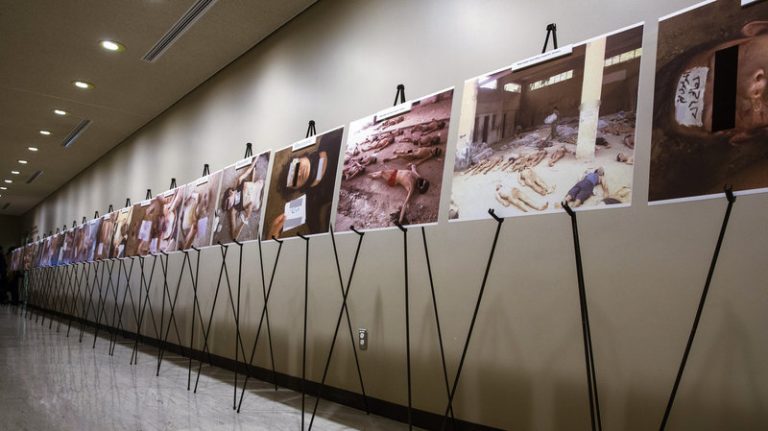
An exhibition of photos, which Caesar smuggled, of the bodies of detainees who died under torture in the cells of the Syrian regime prisons, at United Nations Headquarters – March 10, 2014 (Reuters).
What does Caesar Act stipulate?
The Caesar Act has four main articles related to imposing sanctions on the Syrian regime and its allies. Enab Baladi summarized the conditions for their lifting, as follows:
Imposing sanctions on foreigners supporting the regime
Within 180 days of the signing of the Act, the US President imposes his sanctions on foreigners who are involved in certain activities, including the provision of financial, material or technical support, with prior knowledge, to the Syrian government, one of its entities or politicians.
Sanctions are also imposed on military contractors, mercenaries or paramilitary forces that carry out their war activities, with prior knowledge, inside Syria or on behalf of the Syrian government, Russia, Iran, or anyone who had been previously sanctioned in Syria.
The sanctions include any party that sells or provides goods, services, technology, information, or any kind of support, which facilitates the maintenance or expansion of local government production of natural gas, oil, or petroleum products.
This is in addition to those who sell, provide or cut aircrafts for military use in Syria, and those who have previously, directly or indirectly, provided, with prior knowledge, construction or engineering services to the Syrian government.
With regard to the IDP areas in Syria, the US President must define those regions and who controls them and find out the causes of the forced displacement of people from them, so as to ensure that foreigners are prevented from entering them with reconstruction contracts, which may benefit the Syrian government and its allies.
The penalties include seizing property and preventing visas or any benefits from the US immigration services, with the direct withdrawal of active visas and the imposition of fines on the people involved in them.
Penalizing human rights violators
Sanctions are imposed on persons responsible for human rights violations against civilians or members of their families. The Act determines a group of persons who are proposed to be covered by the sanctions, and whose names must be included in a particular list by the US President within 300 days of enforcing the law, after he decides whether they are responsible or participants, with prior knowledge, in human rights violations, and then renews it annually.
Among the proposed personalities are: The President of the Syrian regime, the Prime Minister and his deputy in Syria, the Council of Ministers, the Head of the Land, Naval and Intelligence Armed Forces, and officials of the Ministry of Interior, including the Political Security Department, Intelligence and Police.
This is in addition to the leaders and deputies of the fourth division of the Syrian armed forces, the Commander of the Syrian Republican Guard, al-Assad’s Advisor for Strategic Affairs as well as the Head and Deputy Head of the Syrian Scientific Studies and Research Center (SSRC).
The proposed personalities also include officials in regime-controlled prisons, governors and heads of security branches in the 14 governorates in Syria appointed by the Syrian president.
Aid to the Syrian people
The Act called on the Congress to continue supporting the Syrian people to ensure peace, stability and development, by evaluating current assistance programs, and by giving a 180-day deadline during which the Secretary of State and the Director of the US Agency for International Development (USAID) will issue a report to the House Foreign Affairs Committee and the US Senate Committee on Foreign Relations, in order to monitor and evaluate programs, their goals, their performance and the difficulties they face.
Within a period of no more than 90 days, the US President should provide an evaluation of the two committees in which he explains the effectiveness, risks and requirements of military or non-military means of protecting civilians in Syria, especially those in besieged areas, stranded at the borders or internally displaced.
The Act authorizes the Minister of Foreign Affairs, after consulting the Attorney General and heads of relevant federal agencies, to provide assistance so as to support entities that investigate crimes, support prosecutors or collect evidence, so that those who have committed war crimes and crimes against humanity are brought to justice, including those who helped committing these crimes, as well as foreign governments and organizations supporting the Syrian government since March 2011.
The Act includes support for NGOs and their licensed activities, and the development of a strategy to facilitate the provision of humanitarian assistance, without allocating additional expenses specific to the law.
What about freezing sanctions?
In accordance with the law, the US president can freeze all or some of the penalties included in the Act, for periods of no more than 180 days, if certain conditions are followed in Syria.
These conditions include the discontinuation of the use of Syrian airspace by Syria or Russia to target civilians with explosives, such as barrel bombs, chemical weapons, unconventional weapons and missiles.
This is in addition to allowing the passage of humanitarian aid to the areas besieged by Syria, Russia, Iran or any foreign supporter, allowing freedom of movement and medical assistance, and stopping the targeting of medical facilities, schools, residential areas, civil societies, and markets.
The conditions also include the Syrian government’s release of all political detainees held within its prisons, the permission of the entry of investigators and human rights organizations to inspect these jails, in addition to the Syrian government’s adoption of steps to comply with its obligations to prevent the production and use of chemical and biological weapons, the permission of a safe, voluntary, and decent return of Syrian IDPs and refugees, and the development of effective means to hold perpetrators of war crimes accountable and bring justice for the victims.
The Act introduces exceptions to what is inconsistent with US national interests and humanitarian interests, with regard to NGOs’ provision of humanitarian activities.
Lawmaking in the US CongressThe Congress is the legislative branch of the US government, and it consists of the House of Representatives, which has 435 members, and the Senate, which has 100 members. Any member of the Congress can submit a bill to his legislative group, which will transfer it in discussions between the relevant committees. If approved, the committees shall refer it to the House of Representatives or the Senate for a vote. When the majority in the House of Representatives and Senate agrees that the bill must be turned into law, it is signed and then sent to the President of the United States. The president may sign it to turn it into law, or he may reject it by veto. In case it is rejected, the Congress can get rid of the presidential veto through the approval of two-thirds of its members in both the Senate and the House of Representatives to turn it into law despite the president’s refusal. |
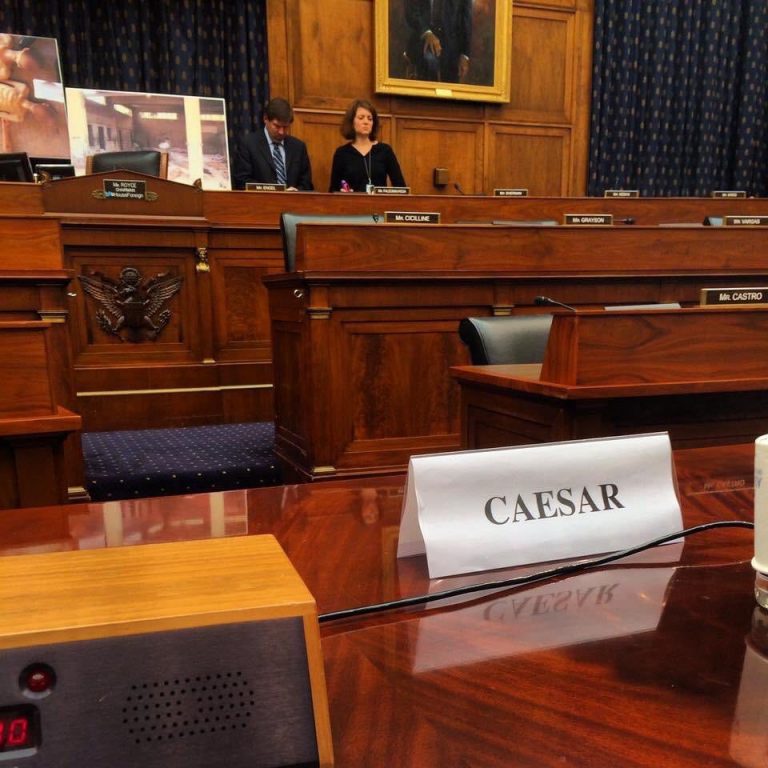
Paper bearing the name of Caesar in the United States Congress – 2014 (Mouaz Moustafa’s Twitter account)
Politically, it made things worse for the regime
Returning to the statements of James Jeffrey, the US special envoy to Syria, in September 2018, when he announced that the United States intends to adopt an “isolation strategy” with its allies that includes severe penalties, if the president of the Syrian regime obstructs the political process aimed at ending the war, or fails to cooperate regarding rewriting the constitution in preparation for elections.
The approval of the Caesar Act came after the Syrian regime obstructed the work of the Constitutional Committee, which held its second round of talks late last month, and ended with the failure to hold any meetings between the opposition and the regime, because the latter rejected the opposition’s agenda and the discussion of constitutional principles, and asked to discuss what it called “national pillars that concern the Syrian people.”
The US State Department accused in a statement on December 1 the Syrian regime of obstructing the work of the Constitutional Committee because it set preconditions for its work.
The US President’s administration aims to “make life as bad as possible for this dilapidated regime, and to make Russians and Iranians who caused this mess flee from it,” as Jeffrey puts it.
According to the US State Department statement, on December 20 this year, “The purpose of our work (in Caesar Act) is to respond to the calls of the Syrian people demanding a lasting political solution to the Syrian conflict in line with Security Council Resolution No. 2254, which provides for the formation of an interim government body, constitution-making, as well as free and fair elections under its supervision.
Mona Jundi, member of Americans for a Free Syria (AFS) and the list of civil society in the Constitutional Committee, believes that the law may be a “means of pressure” on the Syrian regime to force it to negotiate, expressing her hope that the law will be used to push forward for a real political process.
For his part, Mohammed al-Abdallah, the Executive Director of SJAC, insisted that the aim of the act is to pressure the regime to change its behavior, but he added that the sanctions would affect the Syrian people. “It is an almost unsolvable unfeasible equation. If they are imposed, they will indirectly harm the Syrian people, and if they are lifted, they will indirectly revive the Syrian regime,” referring to “political considerations, as the United States does not have weapons and tools in the Syrian file, and sanctions are its only means.”
Al-Abdallah stressed, however, on the need to monitor the effectiveness and impact of the sanctions on the Syrian people, especially since there are previous experiences of the imposition of sanctions on several countries such as Iraq, Libya, North Korea and Iran, and they have not succeeded in changing the behavior of the regime.
According to an opinion poll Enab Baladi conducted on its Facebook page, the results showed that the participants are divided concerning the contribution of the Caesar Act in pushing forward towards political solutions. 46 percent of the votes (502) supported the possibility of the Act playing a role in pushing the Syrian regime to enter into a serious political process, while 54 percent of the votes (599) ruled out that the law would have a role in that.
Caesar Act
|
Double-edged economic weapon
The results of the new penal code are not seen with optimism regarding the impact on the regime, but rather seen with fear of its consequences on Syrian citizens, 83 percent of whom live below the poverty line, according to the 2019 UN humanitarian needs overview.
Although the law provides the US administration with a six-month deadline to impose sanctions, its effects appeared directly with the depreciation of the Syrian Pound, the day after it was signed by the US president, from 900 to 920 Syrian Pounds per one Dollar, according to Syrian Pound Today website, specializing in currency rates.
A six-month period is considered “short” for those who are pursued with sanctions. According to the Syrian-American lawyer and member of AFS, Mona Jundi, US laws “usually” provide a general deadline for the administration before imposing the sanctions, and this is made to “give time to potential violators to suspend their activities, stop their investment and close their bank accounts.”
Restrains resorting to reconstruction
At a time when the Syrian regime is making gains in the field war and is active in promoting “reconstruction” and the return of foreign delegations, Washington has approved the Caesar Act to be the “largest” law of sanctions, if not the first.
The provisions of the Act include all possible assistance to the Syrian regime, from people, companies and foreign countries, including Russia and Iran, which supported it in the political, military and financial fields during the years of the conflict, and signed contracts with it in various economic sectors.
According to the Head of the Syrian Economic Task Force, Dr. Osama Kadi, this law deprives the Syrian regime’s economy of “any external support,” such as the placing of a deposit to support the Syrian Pound or the contribution and entry of construction companies to the Syrian market, which means a new economic “disaster” for it.
Kadi told Enab Baladi that the Act places “great” pressure on the regime’s economic resources and warns of a new depreciation of the Syrian currency, obstruction of any industrial, agricultural or commercial development work, and the abandonment of the regime’s economic allies of it.
With the approval of the House of Representatives and the Senate in the US Congress, the Act has become binding on any future US Administration, and therefore it would be difficult for any future president to stop the sanctions without the reapproval of the Congress.
People are also affected
The Caesar Act is reflected in a decrease in the contributions of the agricultural and industrial sector, energy and trade, a “more severe decrease than before” in the Syrians’ living standards and high unemployment rates, according to Kadi, who predicted that poverty rates would exceed 90 percent of the rest of the Syrian population.
The Head of the Syrian Economic Task Force clarified that the Syrian regime has only two options to confront the law: the first is by the “intransigence” and refraining from proceeding with a just political solution, while ignoring the sanctions and Syrians’ suffering and starvation, and continuing to use his allies, who are already under embargo and boycott.
The second option is by heeding the international calls, implementing the Geneva resolutions and resolution 2254, and stopping the bombing of civilians and the violation of human rights.
There have been frequent UN and international calls since 2011, accompanied by reports that documented violations they described as “crimes against humanity,” amid denial and rejection from the regime, to this date.
Circumvention.. but with difficulty
The Head of SJT organization, Bassam al-Ahmad, confirmed that there will be a kind of circumvention of the Act, especially by pro-regime countries which have a political and economic importance, such as Russia, Iran and China, but the circumvention way and methods will depend need time to be known.
Although he emphasized that the circumvention of the law would be difficult, al-Ahmad indicated that the regime and its allies could avoid it by placing people at the forefront of dealings and registering offshore companies in countries such as Panama.
What can be done is to prepare legal files against specific persons and merchants who meet the criteria mentioned by the Act and communicate with the US specialized authorities to include them on the sanctions list, according to the Director of the SLDP, Ibrahim Olabi
The articles of the Act can be used as a means to threaten any party or country that is trying to legalize the Syrian regime and restore its relationship with it, according to Olabi. He also pointed out that the SLDP has a unit specialized in business and merchants’ rights which is working to prosecute merchants and businessmen who support the Syrian regime, and it can be contacted about these files.
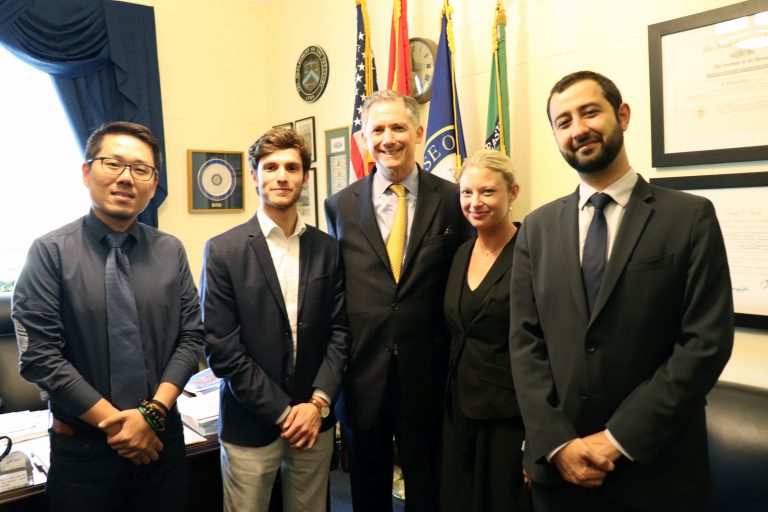
Members of the Syrian Emergency Task Force (SETF) with Congressman French Hill – 2019 (U.S. Congress website)
Organizations that have contributed to the adoption of the Act
Caesar Act reached the White House after the efforts of hundreds of Syrians, who contributed to the political, legal and financial support of the journey of law, through their activities in organizations that adopted the issue of stopping violations committed by the Syrian regime.
Syrian National Movement (SNM)
The Movement started as part of the “National Council,” affiliated to the Syrian National Coalition. It was a political movement whose members formed the Syrian Association For Missing And Conscience Detainees (SAFMCD), in March 2015, and it was the first organization that carried the “Caesar file” and was able to deliver it to the US Congress in 2014.
Syrian-American Council (SAC)
Founded in 2005, in the state of Illinois, USA, the SAC defines itself as a popular organization dedicated to promoting educational, civil, economic and human development, and the advancement of civil freedoms and human dignity in Syria. The organization aspires to build bridges of understanding and cooperation between the American and Syrian people and institutions.
Americans for a Free Syria (AFS)
A non-governmental and non-profit organization that helps enact legislations and policies that consolidate freedom, human rights, accountability, the rule of law and secular democracy for the Syrian people. The organization says it works through excreting direct pressure in the Congress, and by empowering “citizen pressure groups.”
Syrian Emergency Task Force (SETF)
Founded in 2011 to support the Syrian people’s demand for freedom and democracy, regardless of race, region or background, the team says that it supports the Syrian people by informing and educating the American public about the Syrian issue, with the aim of tackling the massive humanitarian crisis, and promoting the development of Syrian civil society, so as to ensure the respect of human dignity and freedom.
Syrian Christians for Peace (SCFP)
It was founded in 2014 and includes a number of Syrian Christian oppositionists. It seeks to provide humanitarian and medical relief to the Syrian people, promote friendly relations between the people of the United States and the people of Syria, and encourage projects and campaigns in support of democratic and comprehensive efforts between Syrians inside and outside the United States.
It also aims, as it defines itself, to educate the public about the importance of multi-sectarian and multi-ethnic dialogue as it relates to Syria, and to encourage the brothers of Syrians from all religious and ethnic backgrounds, including stressing on the historical cooperation and unity of Syrian and Muslim citizens in Syria.
if you think the article contain wrong information or you have additional details Send Correction
النسخة العربية من المقال
-
Follow us :












 US President Donald Trump signing the National Defense Authorization Act that includes the Caesar Act- December 20, 2019 (Reuters – edited by Enab Baladi)
US President Donald Trump signing the National Defense Authorization Act that includes the Caesar Act- December 20, 2019 (Reuters – edited by Enab Baladi)





 A
A
A
A
A
A

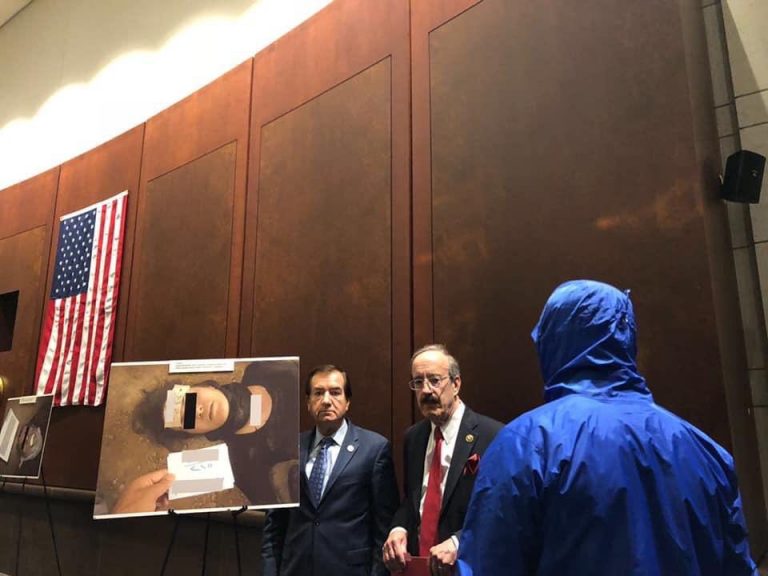
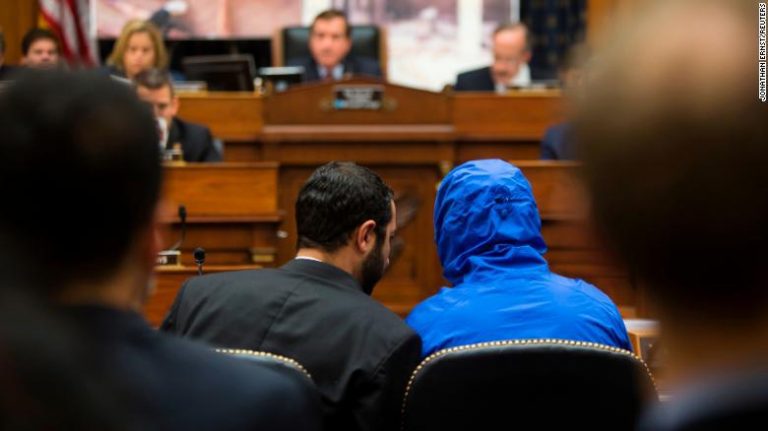



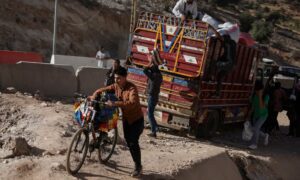




 More In-Depth
More In-Depth